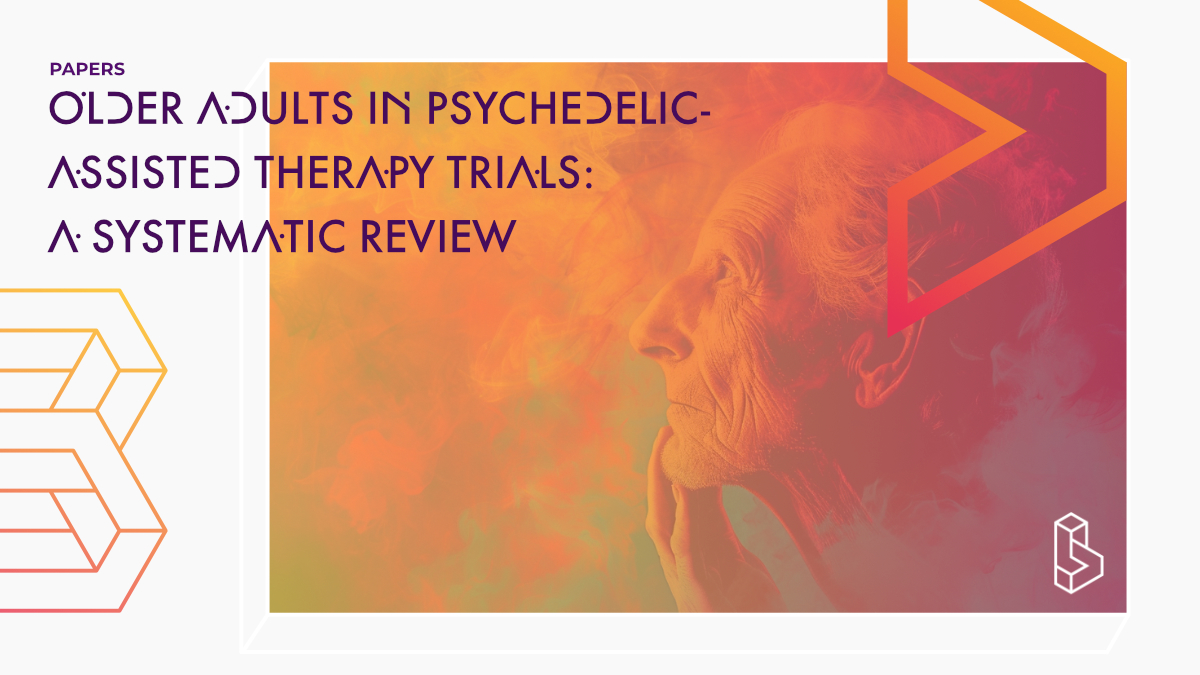This systematic review (n=1400; s=36) aimed to assess the prevalence of older adults in psychedelic clinical trials and explore safety data. Only 19 participants aged 65 or older were identified, constituting less than 1.4% of all trial participants. Detailed safety data for 10 of these older adults revealed no serious adverse events, with only transient mild-to-moderate adverse events related to anxiety, gastrointestinal upset, and hypertension during psychedelic dosing sessions.
Abstract of Older adults in psychedelic-assisted therapy trials: A systematic review
“Background: Growing clinical interest in psychedelic-assisted therapies has led to a second wave of research involving psilocybin, lysergic acid diethylamide (LSD), 3,4-methylenedioxymethamphetamine (MDMA) and other substances. Data suggests that these compounds have the potential to treat mental health conditions that are especially prevalent in older adults such as depression, anxiety, existential distress, and posttraumatic stress disorder.
Aims: The goal of this study was to quantify the prevalence of older adults enrolled in psychedelic clinical trials and explore safety data in this population.
Methods: A systematic review was conducted following the 2020 PRISMA guidelines. Search criteria included all trials published in English using psychedelic substances to treat psychiatric conditions, including addiction as well as existential distress related to serious illness. Articles were identified from literature searches on PubMed, EBSCO, and EMBASE.
Results: 4376 manuscripts were identified, of which 505 qualified for further review, with 36 eventually meeting eligibility criteria. Of the 1400 patients enrolled in the 36 studies, only 19 were identified as 65 or older, representing less than 1.4% of all trial participants. For 10 of these 19 older adults, detailed safety data was obtained. No serious adverse events (AEs) occurred in any older adults and only transient mild-to-moderate AEs related to anxiety, gastrointestinal upset, and hypertension were reported during the psychedelic dosing sessions.
Conclusions: While existing data in older adults is limited, it suggests that psychedelic-assisted psychotherapy can be safe and well tolerated in older adults. Therefore, psychedelic-assisted psychotherapy should be more rigorously investigated for the treatment of psychiatric conditions in this population.”
Authors: Lisa Bouchet, Zachary Sager, Antoine Yrondi, Kabir B. Nigam, Brian T. Anderson, Stephen Ross, Petros D. Petridis & Yvan Beaussant
Summary of Older adults in psychedelic-assisted therapy trials: A systematic review
Current medication treatments for psychological distress in older adults include selective serotonin reuptake inhibitors, serotonin norepinephrine reuptake inhibitors, and atypical antidepressants. However, psychedelic-assisted therapies have only mild-moderate efficacy for the treatment of psychological distress in this population.
Methods
This systematic review included clinical trials investigating psychedelics published in English in peer-reviewed journals from 1950 to 2023.
Studies that enrolled participants with primary psychiatric disorders, substance use disorders and distress related to a serious illness were included. No age criteria were applied for study inclusion.
Results
A total of 4376 articles were identified through the initial query, 20 additional articles were identified through the review of their references, 36 articles were identified for inclusion in this systematic review, and these articles are presented in Supplemental Materials S2.
Find this paper
Older adults in psychedelic-assisted therapy trials: A systematic review
https://doi.org/10.1177/02698811231215420
Paywall | Google Scholar | Backup | 🕊
Cite this paper (APA)
Bouchet, L., Sager, Z., Yrondi, A., Nigam, K. B., Anderson, B. T., Ross, S., ... & Beaussant, Y. (2024). Older adults in psychedelic-assisted therapy trials: A systematic review. Journal of Psychopharmacology, 02698811231215420.
Study details
Topics studied
Palliative Care
Study characteristics
Literature Review
Participants
1400
Humans

